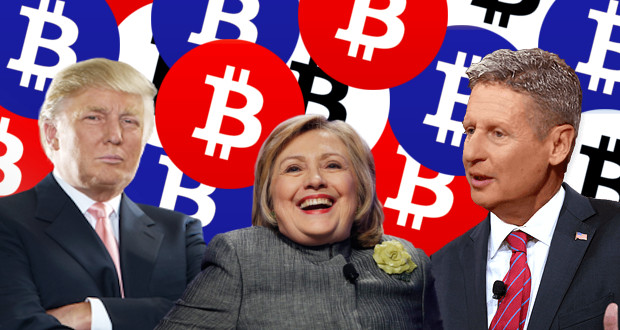Author: Zack Voell
Essential to cryptocurrency ideology is the understanding that governments are unable to impede or otherwise affect the use and growth of alternative, decentralized monies. Perhaps that premise renders an overview of the 2016 presidential candidates irrelevant. Decentralized currencies, moreover, are not a mainstream, headlining policy issue that concern any substantial percentage of American voters, and presidential candidates are not particularly outspoken in their support for or opposition to Bitcoin.
But, for active voters who use and support it, understanding the opinions of the 2016 presidential candidates on Bitcoin is important. This article analyzes various comments by and the campaign platforms of the three major candidates in the 2016 presidential election—Hillary Clinton, Donald Trump, and Gary Johnson—to allow reasonable speculation on how each one would likely approach Bitcoin and the federal regulation thereof.
Hillary Clinton
For starters, the Clinton campaign has continued to not accept financial contributions in Bitcoin since the beginning of the current campaign season (even though Bitcoin entrepreneur Barry Silbert wrote over a year ago about his expectations for her to eventually accept Bitcoin donations). On this fact, CoinTelegraph comments,
[E]lection hopeful Hillary Clinton will not be accepting bitcoin donations to her election war chest. With estimates to the cost of campaigning being placed as high as US$2.5 billion, accepting funds in any form may appear desirable, but for now the…Clinton campaign has not opened their fund to digital currency donations.
Accepting donations in Bitcoin is pretty inconsequential though.
Clinton, more importantly, is an outspoken advocate of advancing government decryption abilities specifically in the context of the May 2016 controversy over decrypting the San Bernardino shooter’s iPhone. Clinton believes in the need for a "Manhattan-like project" to help law enforcement break into encrypted communications.
In an r/Bitcoin thread about Clinton and Bitcoin, Reddit users, in varying degrees of disgust and cynicism, point out the peculiarity of Clinton claiming to be “not a technical person” during her email scandal proceedings while voicing strong opinions on encryption.
A strong anti-encryption position is a naturally unfriendly posture to cryptocurrencies and users of alternate money as a rule. An article from Tech Dirt opines that “Weakening encryption undermines both security and privacy. … This raise serious questions about who is advising Clinton on tech policy.”
Even more curious is the complete policy reversal on encryption from Clinton given her passionate support as Secretary of State for internet freedom. Her support, in fact, directly nurtured the emergence of leading apps and other communication services utilizing state-of-the-art encryption via the Open Technology Fund. Now as a presidential candidate, however, Clinton is on the attack against digital encryption.
Donald Trump
Trump’s tendency for incoherency, inaccuracy and ambiguity should condition any discussion about his specific campaign platforms or broad policy agenda. Do not assume that comment to be an indirect endorsement for “crooked Hillary” though as it merely parses the realities of Trump’s political persona. (Tangentially, a website dedicated to Donald Trump and Bitcoin seems to lobby for Trump’s support of Bitcoin because of its potential to make American great again.)
Trump, quite simply, has yet to verbalize any opinion on digital currency. (But this satirical article from Bitcoin.com is an entertaining dig on Trump’s iconic immigration reform proposals tied to Bitcoin and central banks. Also, read this article on the spoof Twitter account @Trumpchain that tweets like Trump about everything Bitcoin.)
The Trump campaign, however, clearly feeds off of comeuppance and a desire for disruption of the toxic political status quo. Even though Trump’s potent anti-establishmentarianism and Bitcoin’s Schumpeterian-principled disruption are two patently distinct ideals, Bitcoin advocates coaxing President Trump toward light (or no) regulation of digital currency is, perhaps, not altogether unlikely. A recent Coin Telegraph article shares this same view.
Bitcoin could easily become an enemy of the Trump Administration in light of Trump’s brazen announcement that he would attempt to block remittances to Mexico from the United States. Blocking remittances is no paltry threat because, as World Bank research reports, annual monetary transmissions into the region equal twenty-five billion dollars and roughly two percent of Mexico’s GDP.
Genesis Mining, a Bitcoin mining company, scoffs at Trump’s audacious belief that he can stop remittances, and has launched the #ExploreBitcoin initiative to help Mexicans living in the U.S. to send money back home in Bitcoin. About blocking remittances, Genesis Mining writes on their blog:
The solution would be Bitcoin because Bitcoin can’t be stopped. Not by Trump. Not by Putin. Not by anyone. Sure, you can pass regulations to make it more difficult to use but at the end of the day, if people need it, they will always find a way.
Blocking remittances, moreover, would theoretically (and plausibly) generate large amounts of additional transaction volume to Bitcoin exchanges. This would be good news for all Bitcoin users because higher transaction volume closely correlates with a horde of good things like higher price value, higher market cap, etc.
Relatedly, former Texas governor, former presidential candidate, and current Trump endorser Rick Perry spoke quite favorably about Bitcoin at the beginning of this election cycle’s party primary season. Perry said:
We should create regulatory breathing room for banking with digital currencies, like Bitcoin. Digital currencies harbor the possibility of reducing the cost and improving the quality of financial transactions in much the same way that the conventional internet has done for consumer goods and services.
This year old quote from the former governor is the only of meaningful comment associated with Trump and Bitcoin.
Gary Johnson
In March 2016, a candidate comparison website (ISideWith.com) received an answer submitted personally by Johnson to the question: “Should the government classify Bitcoin as a legal currency?” Johnson wrote, “Yes, but it should not replace our national treasury-backed currency.”
Johnson, out of the three major candidates, is the only one who accepts and actively receives campaign contributions in Bitcoin. Johnson’s openness to Bitcoin is not surprising given his affiliation with the Libertarian Party. Former presidential candidate and libertarian-leaning figure Rand Paul, for example, also accepted Bitcoin campaign contributions. Decentralized currency, quite obviously, also advances a multitude of key Libertarian principles.
But Johnson’s involvement with Bitcoin is not new to the current presidential election cycle. In 2014, Johnson showed interest and started to seriously consider investing in Bitcoin. Later, in 2015, this video records the moment when Johnson receives his first Bitcoin from Libertarian entrepreneur Joby Weeks. Aside from the aforementioned online response, Johnson has not voiced any other official opinions on Bitcoin.
About the Author
Zack is an undergraduate student at a small liberal arts school in Pennsylvania where he studies politics, economics, and Spanish. He bought his first Bitcoin in October 2015. Zack blogs occasionally at ZackVoell.com, and can be found on Twitter @ZxVoell_1.
 You, Me, and BTC Your Liberty & Bitcoin Podcast
You, Me, and BTC Your Liberty & Bitcoin Podcast






Related: Hillary Clinton in unveiling her Technology & Innovation initiative has become an outspoken advocate of blockchain technology. https://www.cryptocoinsnews.com/blockchain-presidential-candidate-hillary-clintons-technology-agenda/